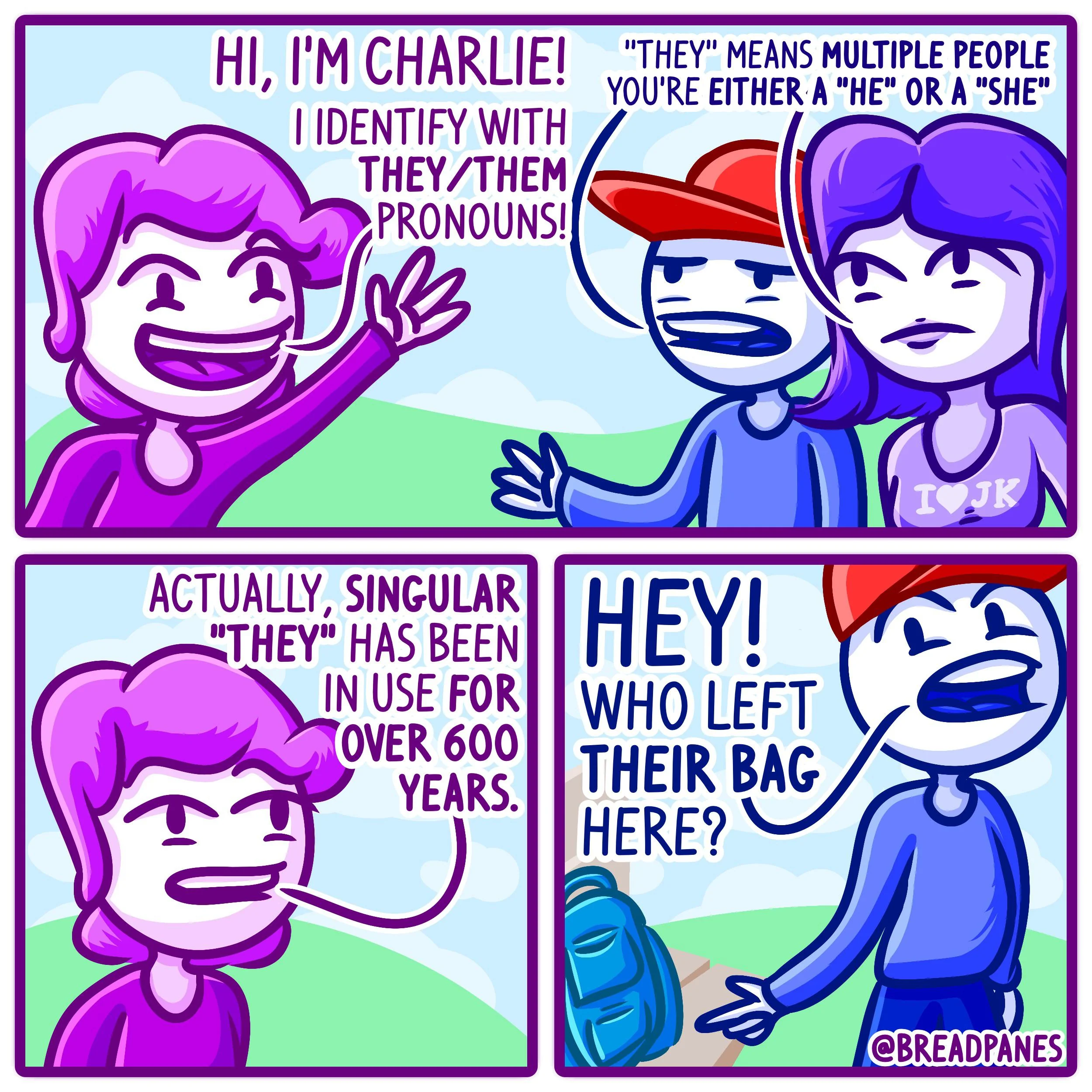They/Them
-
Well... that is entirely a you problem. You should do a little soul searching to figure out why it is so difficult for you to pay someone dear to someone you call a friend the bare minimum amount of respect.
Would you be upset if your friends constantly misgendered you, then acted like you were the asshole because you took issue with it?
-
You don't use the person's name every time when you're talking about them in their presence.
Those who appreciate polite behaviour do.
-
I don't understand what you're trying to express.
-
[email protected]replied to [email protected] last edited by
You're going out of your way to create a problem that doesn't exist.
The problem does exist, that's why you're making suggestions about how to work around the problem.
If you just don't respect people's identity then admit you're bigoted instead of hiding behind faulty logic.
You're jump to conclusions.
-
[email protected]replied to [email protected] last edited by
maybe i have never been in proper situations
Indeed. More information on proper communication for you: https://en.wikipedia.org/wiki/Capitalization
-
[email protected]replied to [email protected] last edited by
You're jump to conclusions
Lol. Alright buddy, I'm done here.
-
[email protected]replied to [email protected] last edited by
You're not going to bother to point out the fault in my logic?
-
If the Dan in your example used he/him pronouns and so did Steve, then it is equally unclear
"I was with Dan (he/him) and Steve (he/him) the other day. He hadn't brought a poster they needed and went back to the car to get it."
There's no way to know whether the "he" is Dan or Steve. The they/them pronoun isn't the problem in your example, the structure of the sentence is.
-
"Can't believe how close we came to an accident on the way here. We were walking past a building with some scaffolding on it, and a brick just about hit me on the head. Fergus was looking up at the site anyway because Fergus's company is advertising on the site, so Fergus saw it fall and stopped me just on time."
Nobody talks like this
-
I’m joining in the “this blew my mind” sentiment and just want to say thanks for sharing this tidbit of info.
-
[email protected]replied to [email protected] last edited by
We use ты for second person singular.
-
[email protected]replied to [email protected] last edited by
No, it's just been a thing forever, and will always be thing. Those teachers, if they ever existed which I doubt, were just dumb fucks from Dumbfuckistan.
-
Stop. You are making some of the senseless things in English make sense. How I’m I supposed to feel superior because my first language is read the way it is written?

-
[email protected]replied to [email protected] last edited by
If you're with Dan (they/them) and Dan (he/him), you would also have the problem when saying
"I was with Dan and Dan the other day. Dan hadn't brought the poster, so Dan went back to the car to get it."
So to avoud confusion, people should not be allowed to be called Dan anymore. In fact everyone gets a UUID so there is no more confusion.
-
Yeah but that's because you see it in archaic contexts. How do you feel about 'thou art tall'?
-
I, too, thought about Drag several times while reading the thread
-
please invent some word for it and go with it
There
isare more than one word. It's going to take quite some time until agreement on the use will distill and become accepted, though. -
There's more than one option, I for one prefer Elverson which is Ey/Em/Eirs
-
That's true, but you can't help but notice that when people coming from this background are taught English, they are usually taught that 'male' pronouns are the default.
If anything, I would support the removal of 'he/him' for all the backlash it will generate.
-
in france "they" invented "iel", a gender neutral pronoun, to replace "il" and "elle". Young people (some?) adopted it rapidly and were using it naturally but the state banned the use of "inclusive language" on all official communications (which includes schools)
i remember thinking that inventing a new pronoun, like they did, was a better solution than choosing one of the two as gender neutral

